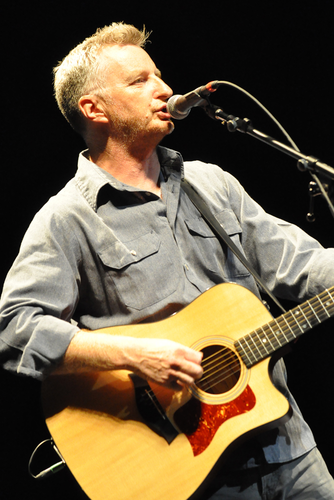Billy Bragg on the Personal and the Political

"Don't just write political songs," says Billy Bragg. "The ability to love people in a selfless way is the key to political action."
Photo by Phil Farnsworth
Billy Bragg is first and foremost an entertainer. And he certainly knows how to play to his audience. When he came onstage at a clinic during Berklee's Five-Week Summer Performance Program, he opened with the song "Sexuality." It was the equivalent of posters on campus that shout, "SEX! Now that I've got your attention . . . " But it did its job; it captured the interest of an auditorium full of high school students who may or may not have heard the 30-year musical veteran's songs before.
Calling for equality for people of any sexual orientation, the song wasn't just an attention-grabber, but a perfect introduction to someone who is not just a musician, but an activist as well. He followed up with "Accountability," which he wrote during anti-globalization protests. In his words, "The job of a musician is to bring people together in support of a cause."
At the same time, he advised students never to lose sight of the people they're singing about. "The best political songs are both personal and political," he said. As an example, he played his song "Keep the Faith," which is about both his audience and his wife. Bragg credited Woody Guthrie for teaching him that "it's not about a slogan, but about the individual and how the individual feels."
This brought Bragg to the work he did with Wilco to set to music unrecorded Woody Guthrie lyrics, which eventually resulted in the album Mermaid Avenue. He recounted how in the mid-'90s Guthrie's daughter Nora contacted him about over a thousand of these lyrics, none of which were set to notation—like Bragg, Guthrie kept the music in his head. Nora wanted to bring her father's music to a new generation, so Bragg enlisted Wilco. They reconstructed the songs, making up the music as they went along. "That's how folk music works," Bragg said. "You change the tune, keep the words."
Bragg treated students to two of the songs recorded for that album—"Way Over Yonder in the Minor Key" and "Ingrid Bergman"—as well as Guthrie's "Ain't Got No Home in This World Anymore." Before the innuendo-filled "Ingrid Bergman," he gleefully reminded everyone, "Just remember who wrote this song. 'This Land Is Your Land'—same guy."
Bragg suggested that students do something similar to practice lyric-writing: find a song you love, take it apart, and put it back together with your own lyrics. In fact, he often does that with his own songs. "If you write political songs, you want to upgrade them to keep them in the here and now," he said. He admitted that he doesn't do this often in concert anymore, because fans prefer the version they've already heard. However, "Waiting for the Great Leap Forwards" lends itself to regular updating: "Were I doing that song here today, I'd write a verse about Cash for Clunkers," he said. "Who would have thought in America socialism would be so popular?"
When asked about his influences, Bragg said that they ran the gamut from Smokey Robinson and the Four Tops to Otis Redding, Simon & Garfunkel, and Bob Dylan. Though he's been variously categorized as punk, folk, and alternative, he said, "as far as I'm concerned, I'm a soul singer." He then went on to sing a song he wrote when he'd heard Mavis Staples was making records again, "Sing Their Souls Back Home." Bragg rounded out the set with old favorites "To Have and to Have Not" and "The Milkman of Human Kindness."
He also related some by-now–canonical Billy Bragg stories: How while he was trying to see a Charisma Records executive, he posed as a TV repairman in order to get into the office and then, after tuning the VCR, handed over his tape. The label eventually released his first record. How Bragg brought John Peel a mushroom biryani after Peel joked on the air that he'd do anything for one. Peel gave him his first radio airplay. How, after his punk band Riff Raff failed, he joined the army and bought himself out of it after basic training, newly committed to being a musician. Bragg said that he started playing at the age of 12, joined a band at 16, quit his job to play full-time at 19, and then had to move back into his mother's house three times before he finally started making a living with music at the age of 25. He used these stories to encourage the students to be creative and persistent in their pursuit of a musical career. "Use your native wit," he said.
Bragg's wit kept students entertained and engaged during the summer clinic—and, along the way, held some good advice, too.
